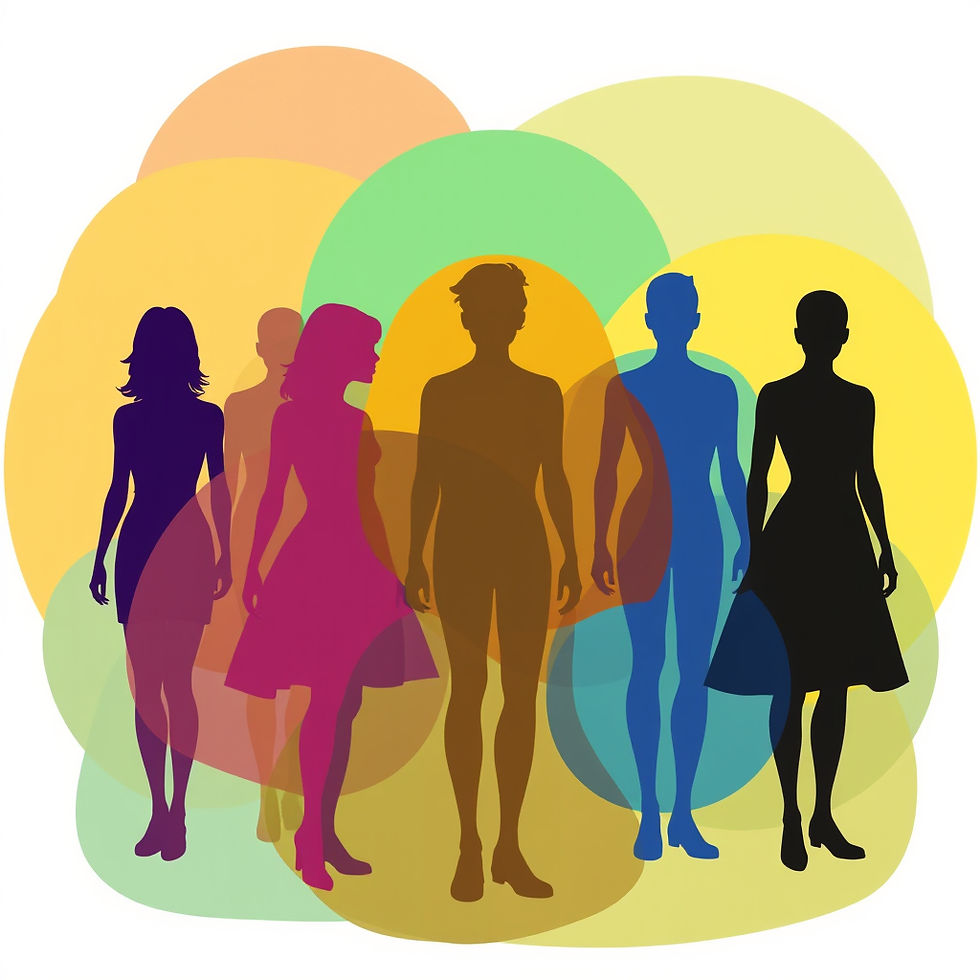How Intersectionality Helps Us Understand Our Struggles
- Dr. MJ Yang

- Sep 27, 2025
- 4 min read
Updated: Sep 30, 2025
This week, I had the privilege of sitting with a client whose story deeply moved me. In our session, they shared the heavy weight of living in today’s atmosphere in the United States—a time when many people feel the impact of discrimination, polarization, and systemic injustice in their daily lives.
The pain they carried was not only personal but also rooted in larger forces that shape opportunities, belonging, and safety.
As we explored these layers together, the concept of intersectionality gave language to what often feels impossible to put into words. It offered a way to understand that their struggles were not individual failings, but reflections of overlapping systems of oppression.
This blog is written in honor of that conversation. It is also for those of you who may not have heard of intersectionality before but are living its reality—navigating unique challenges as immigrants, as Asian Americans, as women, as men, as nonbinary individuals, or as those who hold multiple identities that society often marginalizes.
What Is Intersectionality?
Intersectionality is a term first introduced by pioneering legal scholar Kimberlé Crenshaw. At its core, it describes how different aspects of a person’s identity—such as race, gender, class, immigration status, sexuality, or disability—overlap and interact, creating experiences of both privilege and oppression. These intersections shape how people are seen, treated, and supported in the world.
Think of intersectionality as a crossroads. If you stand at only one road—say, gender—you may encounter certain barriers. But when that road intersects with race, immigration status, or other identities, the challenges multiply and take on unique forms. For example:
An immigrant woman may face challenges not only because she is an immigrant but also because of how women are often treated in both mainstream society and within immigrant communities.
A nonbinary Asian immigrant may experience discrimination differently from a cisgender Asian man, because their gender identity intersects with their racial and immigration identities.
These are not abstract ideas—they are the daily realities of many of our lives.
Why Intersectionality Matters for Mental Health
When these overlapping struggles go unnamed, people often carry them silently. They may feel isolated, unseen, or even begin to blame themselves for the difficulties they face. This can erode self-esteem and leave deep scars on mental health.
Understanding intersectionality helps in several important ways:
It gives people language to describe why their struggles feel so heavy or complicated.
It makes clear that discrimination is not about personal weakness but about systemic injustice.
It opens the door to compassion—for oneself and for others navigating similar challenges.
The Culturally Informed Trauma and Grief Recovery Toolkit developed by the American Psychological Association highlights intersectionality as a crucial lens in healing trauma. Without this perspective, treatment risks missing the very real forces that shape someone’s suffering. With it, we can validate experiences and create space for healing that honors the whole person.
Intersectionality and Asian/Immigrant Experiences
Intersectionality is especially important for Asian and immigrant communities. Many of us carry multiple expectations and pressures—some from society at large, others from within our cultural traditions. For instance:
Asian women often face both sexism and racial stereotypes, leading to unique forms of invisibility or hypervisibility in different settings.
Nonbinary or LGBTQ+ Asian immigrants may find themselves marginalized twice—once within mainstream American culture, and again within their own cultural communities.
Immigrant men may feel pressure to succeed professionally while struggling silently with the isolation that comes from leaving family and familiar support networks behind.
These layers affect mental health in profound ways: shaping how safe someone feels seeking support, influencing relationships, and affecting one’s sense of belonging and identity.
The Power of Naming and Finding Community
Naming intersectionality matters because it allows people to reclaim power from silence.
When you can name what you’re going through, you can recognize that you’re not alone—that your struggles are not personal shortcomings but reflections of systems that affect many others too.
Finding community is equally important. Safe spaces where people share similar intersectional identities allow for vulnerability without constant explanation. For me, this is why I am actively involved in APA Division 35 Section 5, a professional home where Asian American women psychologists can come together. Within that space, I can bring my full self, knowing that others understand without my having to justify or translate my experiences.
This commitment also shaped why I presented at APA 2025 on Asian American International/Cross-Cultural Motherhood. Beyond my identity as an Asian American woman, being an international and cross-cultural mother deeply influences every domain of my life—from travel and education, to language learning, cultural practices, my professional identity, social connections, and even spiritual life.
Acknowledging these layers publicly is both personal and political: it is part of claiming visibility for the complexities of our lived experiences.
Closing – A Path Toward Healing
If you have ever felt unseen, misunderstood, or silenced, know that your experiences are valid.
Intersectionality provides a framework to understand your story more fully, helping you see that your challenges are not personal flaws but the result of overlapping systems of oppression. Healing begins when we name these realities, connect with supportive communities, and embrace the wholeness of who we are.
Therapy can be one of those spaces—a place to explore your story with compassion, to honor the weight you carry, and to find strength in the richness of your intersecting identities.
Your unique journey matters, and your voice deserves to be heard.

_edited.png)


